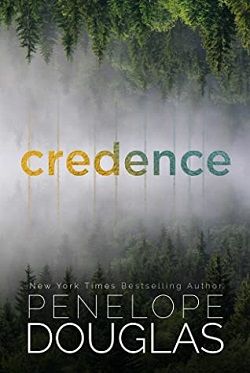Credence, a novel by Penelope Douglas, is a provocative exploration of love, power, and survival through the lens of a dramatic and often unsettling narrative. This book, riding the edges of taboo, presents a unique story set against the isolated backdrop of a snow-covered mountainside, enveloping the reader in an atmosphere as chilling as it is mesmerizing.
The story begins with the protagonist, Tiernan de Haas, trying to find a sanctuary from her emotionally distant and recently deceased parents. Left in her despair, an unexpected solution appears when her step-uncle, Jake Van der Berg, invites her to live with him and his sons, Noah and Kaleb, in their remote cabin. Looking for anything but the suffocating pity of her previous environment, Tiernan accepts, unaware of the profound changes this decision will bring to her life.
Penelope Douglas is known for her skill at crafting deeply flawed and profoundly human characters, and Credence is no exception. Tiernan, initially mute from the trauma and neglect she's endured, slowly finds her voice and strength through the unusual and, at times, morally ambiguous relationships she develops with the Van der Berg men. Each character is uniquely broken in their own way, and Douglas expertly interweaves their stories, drawing the reader into a complex web of emotional, psychological, and physical entanglements.
The narrative is replete with intense, and sometimes controversial scenes that are not for the faint-hearted. The romance is unconventional and steps boldly across lines that many may find uncomfortable. However, Douglas manages to balance these elements without losing sight of the underlying themes of consent, redemption, and empowerment. The transformation of Tiernan from a silenced victim to a protagonist with agency is both compelling and, in the context established by Douglas, believable.
The isolated, snowy setting Douglas chooses is almost a character itself, mirroring the isolation each character feels in their own lives. The cold, harsh conditions outside reflect the tense, charged dynamics within the cabin, making it a perfect crucible for the characters' development. The vivid descriptions of the landscape are stark and beautiful, serving as a breath of cold, fresh air amidst the heat of the book’s more intense moments.
Stylistically, Douglas’s writing is smooth, with a pace that keeps the reader engaged from start to finish. She uses a mix of first-person perspectives that allow deeper empathy and understanding towards the characters. However, this narrative choice also means the reader must confront up-close the complexities and challenging decisions they make. It's a turbulent ride, emotionally and ethically, and will likely leave the reader pondering the nature of right and wrong well after they turn the last page.
The themes of survival and self-discovery are prominent in Credence. Tiernan’s journey highlights the idea that sometimes, in order to find oneself, it's necessary to first get thoroughly lost. The book does an excellent job of showcasing the confusion of adolescence, the pain of growth, and the beauty of finding unlikely havens. In Tiernan’s case, her haven is not a place, but a composite of her experiences and the relationships she forms, which are as harrowing as they are healing.
While Credence will no doubt be divisive due to its bold narrative choices, it's impossible to deny that it is a powerful and daring exploration of what it means to be a survivor. The psychological depth and the unapologetic exploration of complex issues such as familial bonds, trauma, and sexual awakening are handled with a deft hand, making for a provocative reading experience.
In conclusion, Credence by Penelope Douglas is a daring, intense, and thought-provoking novel that pushes boundaries and challenges the reader’s comfort levels. With its complex characters, dynamic inter-personal relationships, and haunting setting, it engages and compels one to face the brutal yet beautiful contradictions of human existence. This book might not be for everyone due to its exploration of deeply controversial themes, but for those who dare, it offers a potent narrative about finding light in the darkest of places.
























Reviews 0
Post a Reviews: